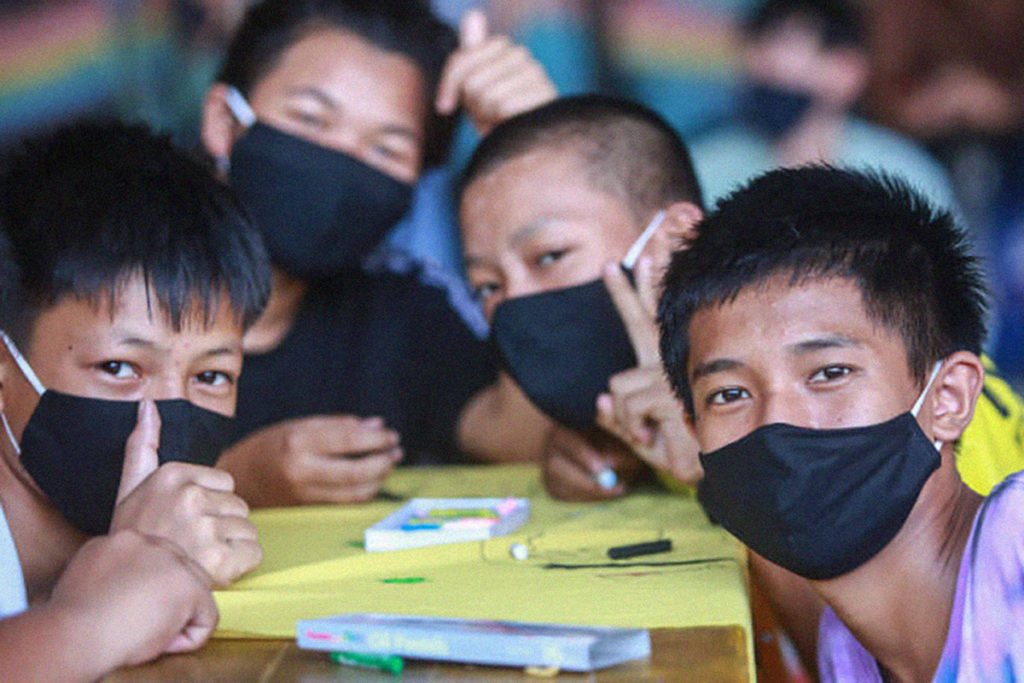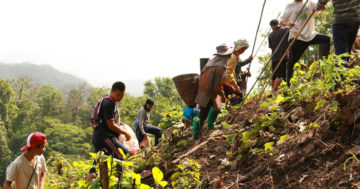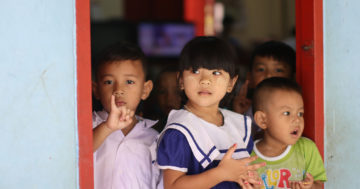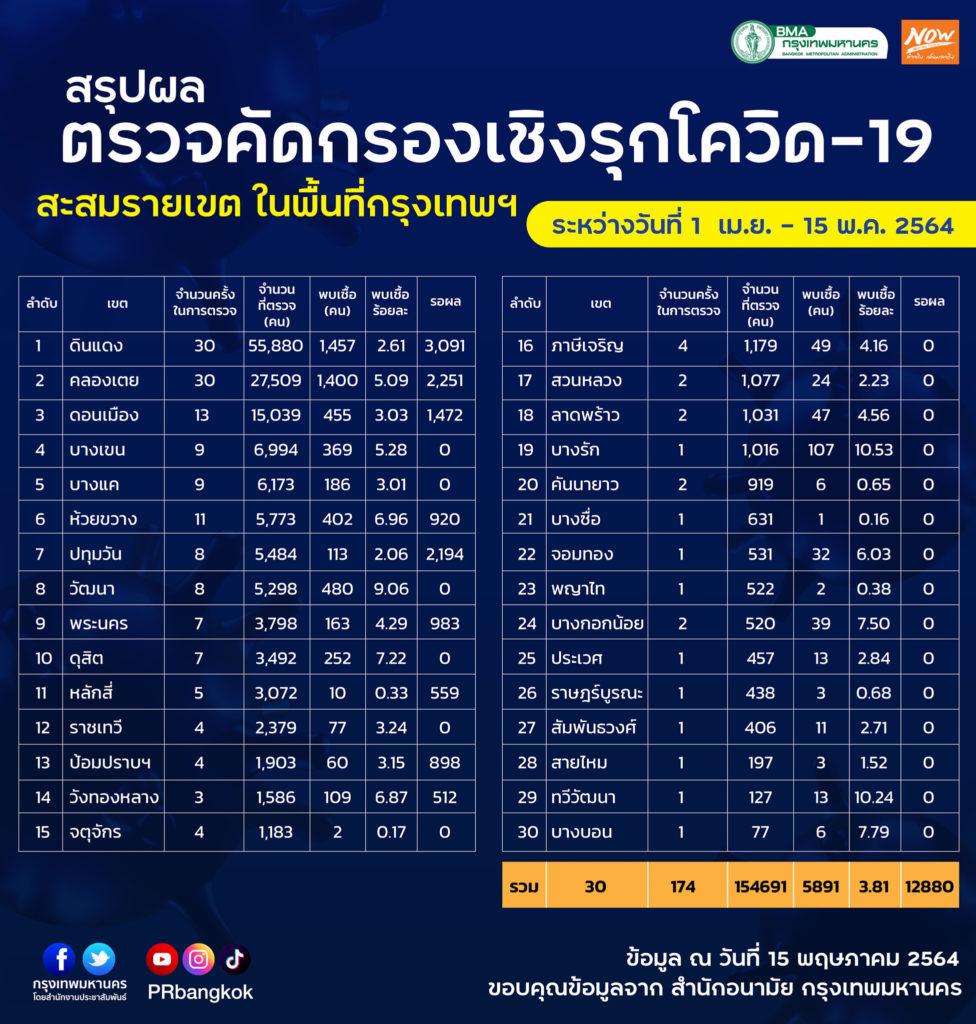
ข้อมูล: กรุงเทพมหานคร โดยสำนักงานประชาสัมพันธ์
With 46 adjacent settlements, Khlong Toei is a sizable community with an estimate of around 200,000 people, both registered and non-registered population. The majority of them work and earn money every day. The COVID-19 outbreak lasted almost over a year and a half from the beginning of 2020 until now. As a result, according to Prapai Sanusan, community coordinator and community rights of the Human Development Foundation in the Khlong Toei community, it is a critical period for the people in the community regarding health, the economy, food, mental health, and children’s education.
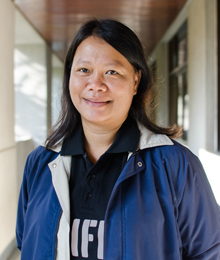
Prapai Sanusan
Prapai Sanusan has 47 years of age. She has spent the last 25 years working in the development of the Khlong Toei neighborhood, where she was born and raised. Prapai addresses a wide range of topics in her work, such as difficulties pertaining to the elderly problems and the activities of children and teenagers.
Most of the residents of Klong Toei are from rural origins and relocated to the city to work as labor vendors. They established cities and led the area’s growth. The Khlong Toei people are diverse, with a range of potentials and undesirable statuses among them. Since they are low-income earners who work long hours, they are aware of the struggles that come with poverty and can relate to one another’s concerns.
Despite the fact that more than 12,000 households live in the village beneath the zinc-roofed buildings (though Prapai claims there may be more than that number of families), Khlong Toei was well-known in the larger community during this time. Since the release of the documentary School Town King, which follows the lives of two teens from the Khlong Toei hamlet and depicts educational inequity, there have been clashes about housing as well as the education of youngsters.
We invite Prapai to begin by talking about the topic of education in order to shed light on the community’s economic status, both in ordinary circumstances and in the aftermath of the epidemic—which is akin to a fresh crisis exacerbating long-standing issues for the people of Khlong Toei.
When the city becomes immobile.
Khlong Toei faces numerous issues, including as the lack of educational opportunities for children. Drug issues, senior citizens who must live alone, children who live with the elderly individuals because working-age adults must go out and get money, etc., all require children to assist in earning money to sustain the family.
Due to the long history of problems in Khlong Toei, the community has developed a network of cooperating organizations that serves as a strength. Examples of these organizations include the community leader network, the Community Organization Development Institute (CODI) at Khlong Toei District, foundations, and various agencies that interact to collaborate on problem-solving, including the current COVID situation.
One of their key goals is “education.”
Prapai informed us that the community across the country appreciates education because everyone wants the next generation of kids and young people to have more opportunities than their parents had. However, there are other significant factors that affect this group of children’s access to school, such as the community’s economic prospects and living conditions. There are four main issues with community network studies:
First and foremost, kids need to be able to learn even in the absence of official identity.
Second, kids need to drink milk and eat food.
Third, kids need to be secure.
Fourth, children must be cared for while their parents are at work.
Despite the free education policy in Thailand, Prapai’s family still has to pay for on-the-go expenses, subsequently the word “free” does not adequately describe their situation. Furthermore, one of the main reasons a child is kept out of the school system is financial difficulties in the home.
Several kids have obligations. Before leaving for school on some mornings, youngsters have to assist their parents in earning money. We so stress the significance of the subject of life. Not that we don’t recognize the value of knowledge; after all, our stomachs are more vital. It matters more that you are without food. Thus, it leaves a space.
Many young people still have to quit the educational system in the middle of their studies in order to find employment, even in non-formal education. Their educational qualifications contribute to their ability to advance in their positions and receive pay increases. It concludes that since their formal schooling does not permit it, this particular group of children must work and study simultaneously.
Children who attend Non-Formal Education classes can only study on Sundays; on other days, they are free to work. The issue of activities aimed at enhancing the quality of life persists, though, as kids are still required to attend on Mondays, Tuesdays, and Wednesdays. This is inconvenient for kids who study non-formal education and must take time from work to participate in these events. Including camping excursions for working individuals who attend non-formal education classes; occasionally, these individuals are unable to take time off work to engage in this activity.
Children who have already left the system or who could leave it soon because of financial issues in their families make up another group. Thus, the Human Development Foundation established the Janusz Korczak School of Southeast Asia to offer education tailored to the requirements of kids and families.
Parents in particular households believe that their kids have to assist them in making money. They will go hungry and without income if they attend school. In order to allow the kids to assist with homework at home for two hours before arriving to study, the Janusz Korczak School of Southeast Asia must schedule the kids’ arrival at 10 a.m. They then returned home early in the evening with their school meals. Perhaps the kids need our assistance. This is also to be adaptable to their circumstances in life.
In a lot of families, grandparents who rely only on a state pension and part-time work in the neighborhood take on the role of child guardians. A major element that forces children out of the educational system and into the public eye, where they may become victims of organized crime, is the breakdown and divorce of their parents, as well as the fragility of the family.
The youngsters need to be embraced by local employees, street teachers, and community leaders. Their purpose is to keep them from being entangled in these cycles. Our responsibility is to prevent rather than to conceal, according to Prapai.
Inequality in the Khlong Toei region has long existed, and during the COVID-19 crisis, it has grown more severe. By using the observations of Khlong Toei employees who operate in the area, Prapai presents the narrative in this issue.
“One is kids who’ve already completed their education. They went outside to apply for work, but were turned down when they revealed they were from Klong Toei. The second is that discrimination is also experienced by those who perform their transmission work. The children’s reflections echoed this.Children from the Klong Toei community have already experienced stigma, including that related to educational inequity. We aim to sound like we want you to glance at us and give us a brief listen. We never wait for assistance by bending our arms and legs. When issues come up, we work together to solve them, argue, and struggle before turning to outside organizations for support.
It is more difficult for children to reenter the system the longer they are absent.
“Bangkok’s labor force is made up of at least 80% Khlong Toei people. As day workers, they perform a wide range of services in Bangkok’s service industry, including housekeeping and security duties. You could refer to that as locating a dinner to share. Due to the fact that taking time off would mean losing their daily income, the majority of them are unable to quit working. This is an eloquent depiction of fragility and inequality, even if the repercussions are present every day.

Anuk Pitukthanin, who oversees the informal children’s program conducted by the Equitable Education Fund (EEF) in Bangkok, clarifies the financial and economic issues associated with the pandemic. Children’s education is directly impacted by it, particularly that of low-income children who live in slum communities, on the streets, in construction camps, and in Khlong Toei and other Bangkok slum areas.
This issue has been ongoing for a while. Additionally, as more machinery is used in Khlong Toei Port, there is a declining demand for porters and a decline in employment. Lockdown procedures and social discrimination against residents in high-risk neighborhoods forced store closures.
If you are from Khlong Toei, your employer might occasionally allow you to take time off work beforehand. Most of them work there on a daily basis. It was challenging for them to lose their day’s pay when they took a break from work.
I’ve spoken with numerous homes. They stated that in order to cover the tuition during the academic semester, they would want a minimum of 3,000 baht. Approximately 10,000 homes have three children. The question at hand is how best to assist the youth.
On June 1st, the official school year begins. As such, Anuk encourages us to consider a number of issues. One: parents have to pay for some costs associated with the start of the school year. Second, because of the financial crisis, some households might not be able to afford to send their kids to further their education.
Of course, food is the current issue. It doesn’t include kids who are also infected, or in some cases have already contracted Covid, and instead focuses on young kids who need to drink milk. And then the question is: Who will handle it? In order to care for their children, some parents had to accept the infection.
“It’s important to remember that several jobs have vanished, so it will be difficult for them to survive.”
Issues related to education and learning challenges that children experience were extensively explored during the initial phase of the outbreak. Due to the pressing need for public health and the fact that the housing situation is a pressing matter that needs to be resolved right away, Anuk notes that the subject of education in Khlong Toei has not received the attention it deserves in light of the present outbreak. However, if we do not consider schooling now, there may be an issue with children’s living and educational circumstances if the outbreak lasts for an additional one to two months.
”I reckon this is a significant issue, and we should begin discussing potential solutions. Children want to learn in the system, of course, but how can they learn in this challenging environment without becoming a burden on themselves? What kind of support structure is in place for them in the forthcoming semester?
The Ministry of Education, local administrative organizations in Bangkok, and educational institutions all possess children’s personal information, which is the first issue that Anuk raises. In order to identify the barriers preventing children from finishing their education, it is necessary to conduct a study of children’s economic circumstances and the issues that affect their households.
“The children on the school’s existing roster should be able to complete it. Following up on the children’s survey, efforts should be made to provide aid, both in the form of immediate support and by lowering various educational costs. This, I believe, is the primary idea.
The second issue is that appropriate agencies need to make sure that this group of kids can continue their education, which is a medium- and long-term solution. In order to offer financing to support these children, it is necessary to take care of households, support scholarships, and link the Equitable Education Fund (EEF) database with the list of children who are extremely poor or impoverished. In addition to the several kinds of support Bangkok has provided.
Children currently have a propensity to leave the educational system somewhat frequently. When the school term begins, we will be able to determine whether the child will drop out or whether it has already begun for a couple of months. Children must drop out when parents are unable to make ends meet. In order to determine the number of lost or at-risk children who could leave the system, I believe it is imperative to screen and monitor kids from now until the start of the school year.
It becomes more difficult for a child to reenter the educational system the longer they are not enrolled. It is not simple to return to the classroom, especially for transitional age students who can support themselves once they enter the workforce.
“While food and public health are important issues right now, we also need to consider the long-term economic situation, and education is an additional factor that needs to be considered,” Anuk said in closing.

